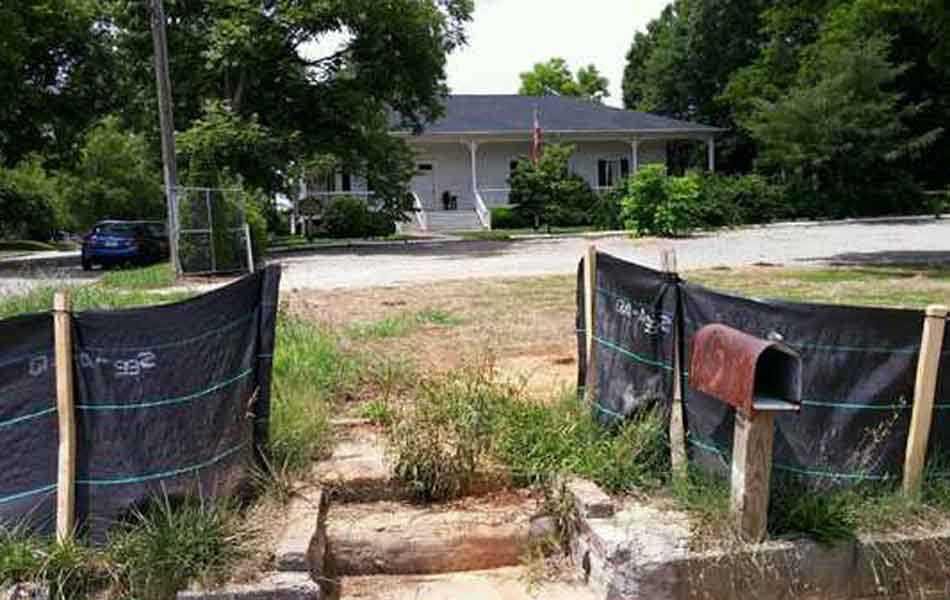At a glance
A house that once sat off Martin Luther King Jr. Boulevard at Maple Street in Gainesville has been removed, opening up a view of the Piedmont Hotel, which was owned and operated by Confederate Lt. Gen. James Longstreet.
GAINESVILLE — From a street named after a civil rights icon, passing motorists now can see the stately remains of a restored hotel once owned by a top Confederate general.
The irony isn’t lost on The Longstreet Society, which is considering several improvements to the grounds surrounding the Piedmont Hotel, including a pedestrian entrance off Martin Luther King Jr. Boulevard.
“We really would like to use the MLK address … but we can’t get the cut for a driveway there,” said Richard Pilcher, who helped found the 21-year-old Gainesville-based group that is dedicated to preserving the memory of Lt. Gen. James Longstreet.
During the Civil War, Longstreet was second in command to Gen. Robert E. Lee. After the war, he not only advocated the right for blacks to vote but led a black militia in a battle against a white paramilitary group in Louisiana.
“It is altogether fitting and proper that Gen. Longstreet’s Hotel now face [MLK],” said Garland Reynolds, a Gainesville architect involved with the society’s formation and the hotel’s restoration.
The clear view of the Piedmont was made possible through the razing of a rundown white clapboard house off MLK at Maple Street — demolition work that could mark the start of other proposed improvements.
The Longstreet Society is looking at keeping the hotel’s main entrance off Maple, but a newly developed master plan shows a pedestrian entrance off MLK that would remove stone steps and a rusty mailbox that sat in front of the old house.
In its place would be landscaping, a flagstone walkway and a picnic table, the plan shows.
Also, designs for the property call for moving a flagpole displaying U.S. and Georgia flags from the front of the hotel to the “entrance garden.”
“Being on the corner [of the property], it sort of ties the whole community into Longstreet’s hotel,” said Rick Freeland, a Gainesville landscape architect who drew up the plan. “Basically, it would be a community park.”
A historical marker describing the property would remain in front of the hotel, “but we might turn it so it faces [Maple Street],” Pilcher said.
Other plans for the property include the development of two memorial gardens — one named after Jamie Hollis, the group’s longtime financial adviser, and Jamie Longstreet Patterson, a Longstreet granddaughter who died in 2014.
Also, a well house is planned in an area where the society believes a well once operated at the hotel.
“We’re talking to some guys now who want to dig that thing out and maybe put it back as a working well,” Pilcher said. “I think it would be a great educational tool.”
The Piedmont Hotel not only serves as The Longstreet Society’s headquarters but as a museum, featuring many artifacts from Longstreet’s day.
During its heyday in the late 1800s, the bustling, three-story hotel that took up a whole city block drew many high-profile visitors, including future President Woodrow Wilson.
A room where Wilson’s wife gave birth to the couple’s first daughter, Jessie, has been preserved.
But like Longstreet's health, the hotel fell into disrepair. After his death in 1904, the Piedmont was used for various purposes over the years, including a boys’ school and a boardinghouse.
Much of the building was razed in 1918 with the remaining portion serving as a home to family members until the 1980s.
A restoration effort began in 1994, soon after the society’s founding. After 13 years of many financial hurdles, the single-story remnant of the original hotel reopened in 2007.
Next up for the master plan is consideration for approval by the society’s board, Pilcher said.
For his part, he sees it as “a road map, and we can take detours. It gives us a good place to start.”
Pilcher said he “doesn’t have any idea” about costs or just how work would be funded. He does envision that the memorial gardens might be first efforts, but otherwise the plan would be carried out “in steps, in phases.”
“We’re never going to have the money to do it all at once,” he said.


